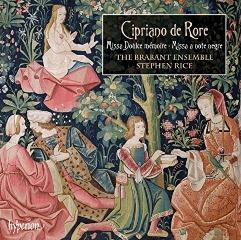Cipriano De Rore - Missa Doulce Memoire; Missa A Note Negre (2013)
Cipriano De Rore - Missa Doulce Memoire; Missa A Note Negre (2013)

1. Rore: Missa Doulce Memoire - 1. Kyrie 2. Rore: Missa Doulce Memoire - 2. Gloria 3. Rore: Missa Doulce Memoire - 3. Credo 4. Rore: Missa Doulce Memoire - 4. Sanctus & Benedictus 5. Rore: Missa Doulce Memoire - 5. Agnus Dei 6. Rore: O Altitudo Divitiarum 7. Rore: Fratres, Scitote 8. Rore: Illuxit Nunc Sacra Dies 9. Rore: Missa A Note Negre - 1. Kyrie 10. Rore: Missa A Note Negre - 2. Gloria 11. Rore: Missa A Note Negre - 3. Credo 12. Rore: Missa A Note Negre - 4. Sanctus & Benedictus 13. Rore: Missa A Note Negre - 5. Agnus Dei The Brabant Ensemble Stephen Rice - conductor
The Brabant Ensemble continues their investigation into unknown jewels of the Low Countries Renaissance, researched by their director Stephen Rice and recorded with equal amounts of passion and erudition by the young singers of the group. Cipriano de Rore was and is principally known as a madrigal composer. This recording presents some of the least well-known works in de Rore's output. It contains two Mass settings based on French chansons, Missa a note negre on a composition by Rore himself, and Missa Doulce memoire, which takes one of the sixteenth century's greatest hits as its inspiration. Also included are three motets. Fratres: Scitote is apparently a unique instance of composition to its text: St Paul here tells the story of the Last Supper, in which Jesus takes bread, blesses and distributes it, and thereby institutes the ritual of Holy Communion. ---Editorial Reviews, amazon.com
Cipriano de Rore is best known today as one of the finest exponents of the madrigal but his sacred output deserves to be better known: apart from three fine recordings of the impressive Missa Praeter rerum seriem, little of it has reached the discography, so the Brabant Ensemble’s campaign in favour of neglected composers finds another worthy candidate. Both of the Masses on this recording are based on chansons, one the famous Doulce mémoire by Pierre Sandrin, the other by Rore himself. His contrapuntal writing, though considerably intricate at times, has a lucidity that the Brabant Ensemble’s light sound emphasises. Of the two works, the first is perhaps the more immediately approachable and memorable.
The lightness just mentioned is now something of a trademark of this ensemble, a feature accentuated by the slightly recessed sound recording. The drawback is that the grain of the individual voices is ironed out, as also may be the finer nuances of interpretation; and the danger, that the impression of distance isn’t just a spatial one. The range of Rore’s invention gives more than enough purchase for the singers to sink their teeth into, and while the livelier situations yield the livelier results (try the ‘Hosanna’ of Missa Doulce mémoire), a more reflective atmosphere need not preclude the dynamic shaping of events (as in the motet O altitudo divitiarum). The Brabants have established for themselves a recognisable sound; an equally worthy goal would be a more determined characterisation of individual composers and works. ---Fabrice Fitch, gramophone.co.uk
Cipriano de Rore to jeden z mistrzów polifonii franko-flamandzkiej, działający głównie we Włoszech, gdzie w latach 1540-45 był m. in. kapelmistrzem bazyliki ś. Marka w Wenecji. Płyta z muzyką sakralną Cipriano de Rore, nagrana przez The Brabant Ensemble pod dyrekcją Stephena Rice'a to kolejna płyta w serii renesansowych dzieł sakralnych wydawanych przez brytyjski Hyperion. Tak jak poprzednie płyty tego zespołu, licznie ponagradzane przez krytykę muzyczną, i ten album to wykonawczy rarytas, zasługujący na szczególną uwagę. Rekomendacja miesiąca! ---empik.com
download (mp3 @320 kbs):
yandex mediafire ulozto gett bay files








